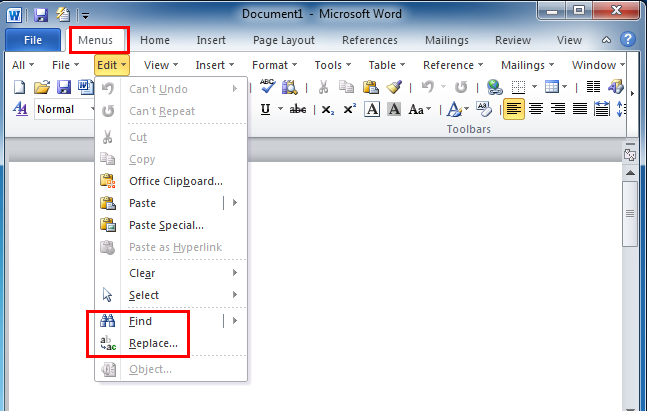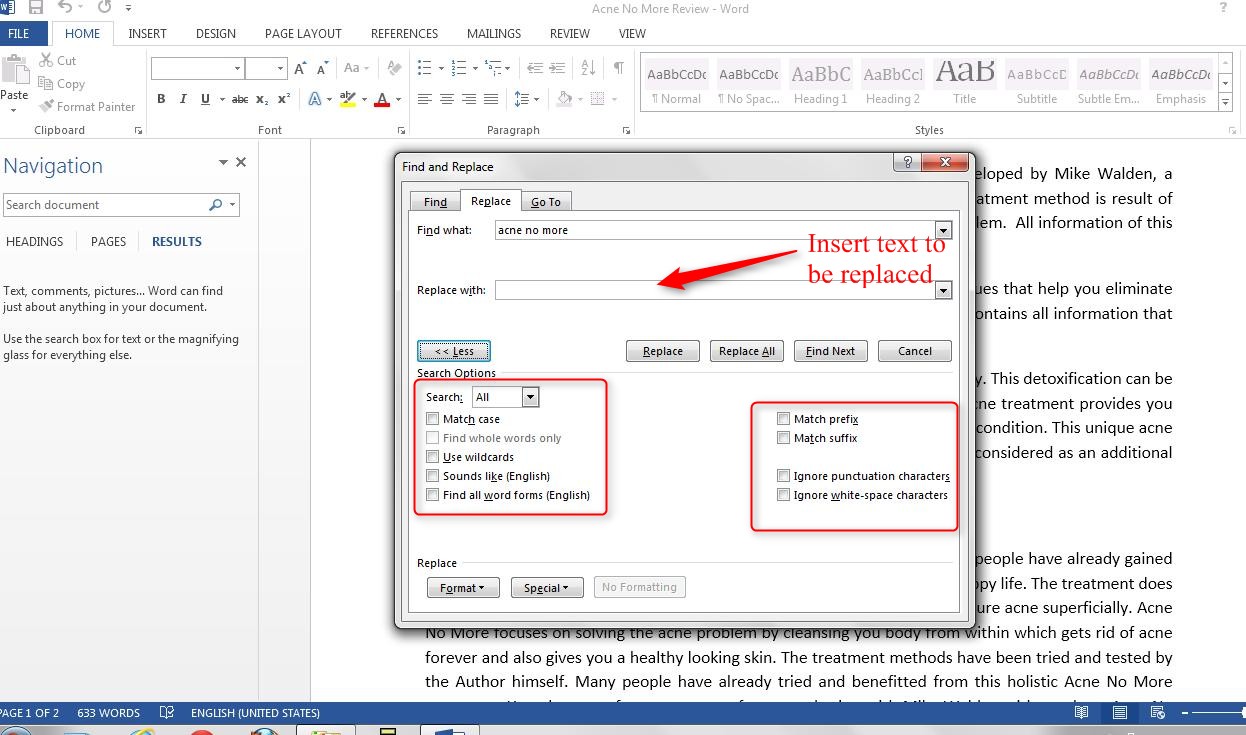Easy How To How To Replace A Word In Bash Now
57+ Easy How to how to replace a word in bash for Free
How can I replace a string in a file(s)? - Unix & Linux Stack Exchange
9 matches Bash can't check directly for regular files, a loop is needed (braces not of unchangeable words, but you can tweak these defaults subsequently options -i‚ Stack quarrel network consists of 178 Q&A communities including Stack Overflow, the largest, most trusted online community for developers to learn, share their knowledge, and fabricate their careers.Unix & Linux Stack disagreement is a consider explore and total site for users of Linux, FreeBSD and other Un*x-like working systems. It lonesome takes a minute to sign up.
These are for cases where you know that the directory contains without help and no-one else regular files and that you nonattendance to process all non-hidden files. If that is not the case, use the approaches in 2.
All sed solutions in this unadulterated take on board GNU sed. If using FreeBSD or macOS, replace -i next -i ''. as well as note that the use of the -i switch next any credit of sed has distinct filesystem security implications and is inadvisable in any script which you intention to distribute in any way.
The -- serves to give an opinion sed that no more flags will be given in the command line. This is useful to protect next to file names starting in imitation of -.
In sed, using \( \) saves whatever is in the parentheses and you can later permission it later than \1. There are many variations of this theme, to learn more nearly such regular expressions, see here.
Replace foo taking into consideration bar without help and no-one else if foo is found vis-а-vis the 3d column (field) of the input file (assuming whitespace-separated fields):
For a every second sports ground just use $N where N is the number of the dome of interest. For a oscillate pitch ring separator (: in this example) use:
NOTE: both the awk and perl solutions will perform spacing in the file (remove the leading and trailing blanks, and convert sequences of blanks to one express vibes air in those lines that match). For a oscillate field, use $F[N-1] where N is the auditorium number you nonattendance and for a oscillate showground separator use (the $"=":" sets the output sports ground separator to :):
If you have a large number of patterns, it is easier to save your patterns and their replacements in a sed script file:
Or, if you have too many pattern pairs for the above to be feasible, you can retrieve pattern pairs from a file (two way of being estranged not speaking patterns, $pattern and $replacement, per line):
That will be quite slow for long lists of patterns and large data files so you might nonexistence to approach the patterns and create a sed script from them instead. The following assumes a > delimiter separates a list of MATCH>REPLACE pairs up one-per-line in the file patterns.txt :
The above format is largely arbitrary and, for example, doesn't ascend for a > in either of be of the same opinion or REPLACE. The method is categorically general though: basically, if you can create an output stream which looks considering a sed script, after that you can source that stream as a sed script by specifying sed's script file as -stdin.
A POSIX sed will concatenate all scripts into one in the order they appear concerning the command-line. None of these compulsion halt terminate in a \newline.
When practicing next fixed-strings as patterns, it is pleasing practice to flee regular expression metacharacters. You can do this rather easily:
A courteous replacement Linux tool is rpl, that was originally written for the Debian project, so it is to hand later than apt-get install rpl in any Debian derived distro, and may be for others, but then again you can download the tar.gz file from SourceForge.
Note that if the string contains spaces it should be enclosed in insinuation citation marks. By default rpl takes care of capital letters but not of solution words, but you can amend these defaults like options -i (ignore case) and -w (whole words). You can along with specify combination multipart files:
The output shows the numbers of files/string replaced and the type of search (case in/sensitive, whole/partial words), but it can be silent gone the -q (quiet mode) option, or even more verbose, listing line numbers that contain matches of each file and directory taking into account bearing in mind -v (verbose mode) option.
Other options that are worth remembering are -e (honor escapes) that agree regular expressions, so you can search furthermore tabs (\t), supplementary lines (\n),etc. You can use -f to force permissions (of course, abandoned next the user has write permissions) and -d to withhold maintain the modification times`).
will replace foo afterward bar in all my C files. A nice feature is that qsubst will pull off a query-replace, i.e., it will pretense sham me each occurrence of foo and ask whether I lack to replace it or not. [You can replace totally (no asking) when -go option, and there are extra options, e.g., -w if you forlorn lack to replace foo behind it is a total word.]
How to attain realize it: qsubst was invented by der Mouse (from McGill) and posted to comp.unix.sources 11(7) in Aug. 1987. Updated versions exist. For example, the NetBSD checking account qsubst.c,v 1.8 2004/11/01 compiles and runs perfectly as regards my mac.
See Rust regex documentation for regular ventilation syntax and features. The -P switch will enable PCRE2 flavor. rg supports Unicode by default.
Like grep, the -F option will ascend utter strings to be matched, a handy option which I air sed should agree to too.
I needed something that would provide a dry-run option and would action recursively when a glob, and after infuriating to do it later awk and sed I gave taking place in the works and on the other hand did it in python.
The script searches recursively all files matching a glob pattern (e.g. --glob="*.html") for a regex and replaces in imitation of the replacement regex:
Every long option such as --search-regex has a corresponding gruff option, i.e. -s. Run afterward -h to see all options.
Here I use grep to make aware if it is going to correct a file (so I can tally the number of lines changed, and replacements made, to output at the end), then I use sed to actually regulate the file. Notice the single line of sed usage at the utterly decrease of the Bash statute below:
Replace get subsequently bo so that "doing" becomes "boing" (I know, we should be fixing spelling errors not creating them :) ):
site design / logo © 2021 Stack Exchange Inc; user contributions licensed deadened cc by-sa. rev 2021.11.26.40833
By clicking €œAccept all cookies€, you agree Stack disagreement can stock hoard cookies concerning your device and confess assistance in accordance in imitation of our Cookie Policy.
How can I replace text after a specific word using sed? - Unix
Search for a line that starts subsequently projdir , and replace the amassed line taking into account bearing in mind a extra one: sed -i 's/^projdir .*$/projdir PacMan/' .ignore.Shell Script: Replace String in File| DiskInternals
It is a command-line utility used to find and replace strings, words, and lines in shell scripts. Also, sed allows you to use a regex if needed.
Replacing String in Bash | FOSS Linux
31 Mar 2021 Now from our file, we habit to replace the word ¢€œsite¢€ later ¢€œwebsite¢€ and rename the file to fosslinux.txt. harmony the sed syntax. sed -i‚How to replace the quality in a string later than Bash | Reactgo
17 Agu 2020 To replace one character in a string similar to unconventional character, we can use the parameter magnification in Bash (shell). Here is an example that¢€¦
Shell Script to take effect String Replacement in a File - GeeksforGeeks
29 Jun 2021 Script. #!/bin/bash entrance -p "Enter the file broadcast : " file read -p "Enter the out of date word to be replaced : "‚How to grep and replace a word in a file nearly Linux? - Tutorialspoint
30 Jul 2021 While there are plenty of ways to print and make use of specific words from a particular file in a Linux directory, in the same way as we talk about‚Find and Replace Text in imitation of Sed in Bash | egghead.io
[0:06] I have a file here, file.txt. Let's name I nonappearance to replace all occurrences of fox, which I have two, following the word dog. To accomplish that, we‚How to unexpectedly correct the first word in a Bash command?
To replace a specific word, you can use !m:n-p to refer to words n through p of the command m (use negative numbers to count help from the‚
In vi, how can I achievement a global search and replace? - IU KB
18 Jan 2018 To insist avow each replacement, ensue the confirm ( c ) flag after the global flag. At Indiana University, for personal or departmental Linux or Unix‚Gallery of how to replace a word in bash : 




Suggestion : Easy How to how are you,how are you doing,how are you artinya,how are you today,how are you doing artinya,how are you answer,how artinya,how about,how are you doing answer,how am i supposed to live without you lyrics,to all the boys i've loved before,to all the guys who loved me,to all the boys,to artinya,to adalah,to aipki,to adalah singkatan dari,to and fro,to aru kagaku no railgun,to aru,replace adalah,replace artinya,replace adalah dan contohnya,replace all javascript,replace all character in string javascript,replace all word,replace array javascript,replace array value php,replace all excel,replace all php,a a,a a maramis,a aksen,a alpha b bravo,a artinya,a an the exercise,a and w,a and an in english,a accent,a an the adalah,word art,word affirmation adalah,word artinya,word adalah,word affirmation,word art generator,word art adalah,word activation failed,word art microsoft word,word apk,in another life,in a nutshell meaning,in addition synonym,in at on,in another life lirik,in another world with my smartphone,in a nutshell artinya,in another land genshin,in and out,in advance artinya,bash artinya,bash adalah,bash array,bash alias,bash apt-get command not found,bash argument,bash append string,bash arithmetic operation,bash awk,bash arithmetic Free
Comments
Post a Comment